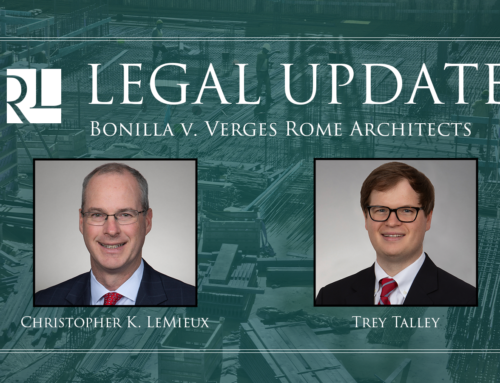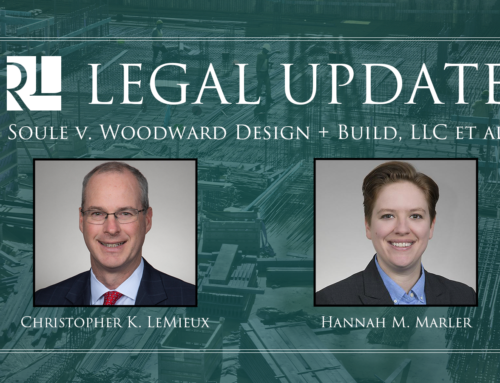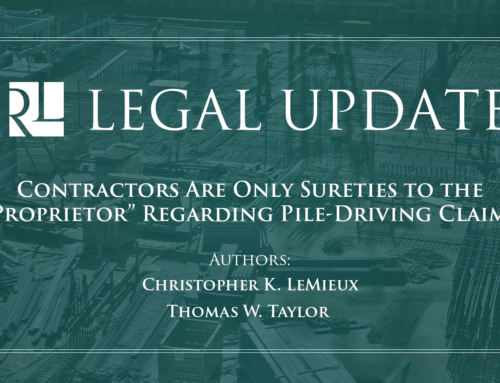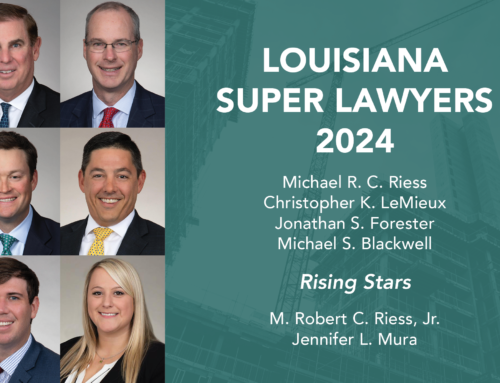 Jeff Mercer, L.L.C. v. Austin Bridge and Rd., LP, 2022-0423 (La. App. 1 Cir. 11/4/22) (La. App. 1st Cir. Nov. 4, 2022)
Jeff Mercer, L.L.C. v. Austin Bridge and Rd., LP, 2022-0423 (La. App. 1 Cir. 11/4/22) (La. App. 1st Cir. Nov. 4, 2022)
Authors: Christopher LeMieux and Trey Talley
Res judicata is not applicable solely on the basis that a lawsuit arises out of the same transaction or occurrence as a previous lawsuit – all elements of the res judicata statute must be met.
Jeff Mercer, L.L.C. v. Austin Bridge and Rd., LP arises out of two construction projects in which Jeff Mercer, LLC (“Mercer”) was a subcontractor and Austin Bridge and Road, LP (“Austin Bridge”) was the general contractor. After a dispute arose on the projects, Mercer filed suit against Austin Bridge and its sureties and insurers. In the Petition, Mercer alleged that Austin Bridge failed to properly compensate it for work performed and completed on the projects.
Subsequently, Austin Bridge and its sureties and insurers filed a peremptory exception of res judicata based on a previous suit that was filed by Mercer against the Louisiana Department of Transportation and Development arising out of the same projects. Importantly, however, Austin Bridge was not a party to the previous lawsuit. Nevertheless, Austin Bridge argued that Louisiana Code of Civil Procedure Article 425 states that “[a] party shall assert all causes of action arising out of the transaction or occurrence that is the subject matter of the litigation.” Austin Bridge reasoned that since Mercer failed to assert its cause of action against Austin Bridge at the time of the first lawsuit, Article 425 applies to bar the second lawsuit on the basis of res judicata. The trial court ultimately agreed with Austin Bridge and granted its exception of res judicata.
On appeal, the First Circuit reversed. The Court explained that at the time the suit was filed, there was a split in the circuits regarding the issue of the relationship between Louisiana Code of Civil Procedure Article 425 and the res judicata statute, Louisiana Revised Statutes 13:4231. However, while the lawsuit was pending, the Supreme Court of Louisiana resolved this split in the case of Carollo v. State, 346 So.3d 751, ruling that the two articles work in conjunction with one another, i.e., all elements of both articles must be met in order for res judicata to apply, and there is no independent claim preclusion based on Louisiana Code of Civil Procedure Article 425 alone. Thus, the court required the following factors must be met: “(1) the judgment is valid; (2) the judgment is final; (3) the parties are the same; (4) the cause or causes of action asserted in the second suit existed at the time of final judgment in the first litigation; and (5) the cause or causes of action asserted in the second suit arose out of the transaction or occurrence that was the subject matter of the first litigation.”
Based on the Supreme Court’s ruling, the First Circuit ultimately ruled that since Louisiana Revised Statutes 13:4231 requires that both parties were also parties to first lawsuit, and since Austin Bridge was not a party to the first lawsuit, res judicata was not met. The Court therefore reversed the trial court’s decision and denied Austin Bridge’s exception of res judicata.
Between the recent cases of Carollo v. State and Jeff Mercer, L.L.C. v. Austin Bridge and Rd., LP, the law has become very clear in Louisiana with respect to res judicata. In order for res judicata to apply, all elements of the res judicata statute, Louisiana Revised Statutes 13:4231, must apply. Louisiana Code of Civil Procedure Article 425 is encompassed within Louisiana Revised Statute 13:4231, and there is no longer an independent claim preclusion based solely off of Article 425 alone.



